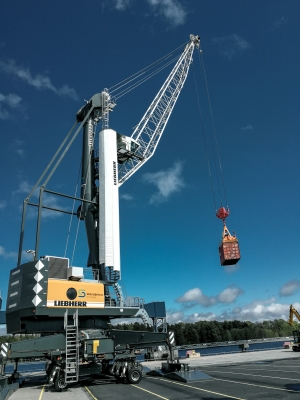


(Posted on 19/05/21)
The Port of Södertälje underlines its efforts to become a Green Port with the acquisition of the first Liebherr mobile harbour crane running on fossil-free HVO100 diesel. The new LHM 420 mobile harbour crane was recently delivered to the port and will significantly improve handling capacity in the container and project cargo sector.
Rostock (Germany), May 2021 – With its proximity to the good infrastructure of Stockholm and its metropolitan area, the Port of Södertälje has a unique location in one of the most expansive regions in Scandinavia.
The Port of Södertälje purchased a new Liebherr mobile harbour crane, type LHM 420 in 2020. The new machine was delivered in March 2021 and is already in operation at the port. With its lifting capacity of up to 124 tonnes and its 360-degree mobility, the crane offers the port flexibility in handling a wide range of goods. In addition, the crane is fully loaded with various assistance systems that make container handling even more effective and safe. Liebherr assistance systems such as the Vertical Line Finder, the Teach-In system or the Advanced Container Control make the crane a partially automated and intelligent crane. In addition, due to the proximity of the port to the city, the LHM noise insulation is installed. “The timing for us to invest in a third mobile harbour crane is perfect. It means that we can offer our customers a more efficient handling and permits continuing growth within the container segment as well as project cargoes”, says Robert Tingvall, CEO at Port of Södertälje, “we have a very modern terminal, focusing on efficiency, automation, and digitisation. We are very pleased and happy about this new crane.”
Besides all the useful and efficiency-enhancing features, the real special characteristic of the new machine for Sweden is its type of fuel. The machine is the first Liebherr mobile harbour crane to run on HVO diesel, which is almost emission-free. HVO Renewable Diesel is a premium fossil free diesel product made of 100% renewable raw materials, which does not release any new carbon dioxide into the atmosphere. It is produced by hydro-treatment of vegetable oils and/or organic fats. The result is a premium quality fuel with a chemical structure almost identical to regular diesel and can therefore fully replace fossil diesel. The Port of Södertälje was the first port in Sweden to convert to fossil-free fuels. Since 2016, the port uses the environmentally beneficial fuel HVO100 to run its vehicles, machinery, and cranes.
Bruks Siwertell Group has announced a leadership transition as Peter Jonsson steps down as CEO after... Read more
ClassNK has issued an approval in principle (AiP) for a Rigid Windsail Type Wind-Assisted Propulsion... Read more
Elcome International’s new high-speed internet service, WELCOME, is revolutionising the way ship... Read more
Kaiko Systems, a leader in AI-driven frontline intelligence for the maritime industry, today announced... Read more
Marcegaglia’s latest acquisition, the LHM 600, marks a significant milestone as the 2,000th mobile... Read more
The Isle of Man Ship Registry (IOMSR) is playing a key role in the development of a high-tech sail aimed... Read more
AtoB@C Shipping, subsidiary of ESL Shipping, has taken delivery of Terramar in Goa, India on 14 March... Read more
As a new strategy period commences, VIKING Life-Saving Equipment A/S has achieved strong financial results... Read more
Baltic Exchange has introduced a series of green fuel options to its FuelEU voyage and compliance cost... Read more
Veson Nautical, a global leader in maritime data and freight management solutions, and Cargill have... Read more